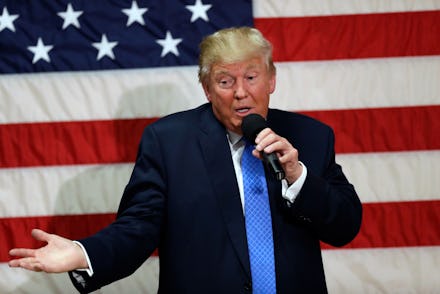Does Trump take a salary? Here's where Trump's campaign promise stands.

At a town hall meeting on Sept. 17, 2015, then-presidential candidate Donald Trump said, "The first thing I’m going to do is tell you that if I’m elected president, I’m accepting no salary, OK." Trump stood by that statement as late as Nov. 13, 2016, when he told CBS' Lesley Stahl on 60 Minutes that he would not accept the standard $400,000 salary for serving as president. Stahl asked, "Are you gonna take the salary, the president’s salary?" To which he replied, "Well, I’ve never commented on this, but the answer is no. I think I have to by law take $1, so I’ll take $1 a year."
Now that he has been president for almost a month (yes, it feels like it's been seven years), can we find out if he kept his word?
Trump can't completely reject his salary.
Trump is correct that he is required by law not to refuse a salary entirely. Rob Goodman wrote in The Atlantic that the idea that the president must take a salary is "even older" than the first congress. The founders wanted to be sure that the president was serving the public interest and not his private interest.
If he took no salary, he "might be subject to corruption, to coercion by the members of Congress who held the pursestrings, or to the temptation to sell policy to the highest bidder," Goodman wrote.
It is deeply ironic that even in an attempt at magnanimity, Trump ended up pledging to do something thought to lead to corruption.
It's not yet possible to know if Trump has actually agreed to take a $399,999 pay cut. There are at most two pay cycles in which he could have received a direct deposit or paper check. One could submit a Freedom of Information Act request for Trump's pay stub, which would provide concrete evidence one way or the other. However, the administration could fight that release if it wanted.
The only other way to prove Trump has kept his promise is by looking at his 2017 tax returns — which history tells us we probably won't be doing.